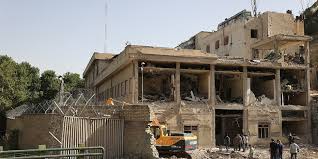Our nuclear activity used as pretext to launch attacks: Iran envoy

Iran’s UN ambassador has accused several Western countries of using its nuclear program as a political tool to justify sanctions and covert attacks.
Speaking at the UN Security Council on Tuesday, Ambassador Amir Saeid Iravani said the peaceful nature of Iran’s nuclear program is well-documented, yet it’s repeatedly portrayed as a threat.
“Some nations distort facts to use our legal nuclear activities as an excuse for unlawful pressure,” Iravani said.
West Continues to Pressure Iran on Nuclear Front
The United States and European powers have long expressed doubts about the peaceful intent of Iran’s nuclear work.
Those doubts grew after Washington withdrew from the 2015 nuclear deal (JCPOA) in 2018. That agreement had eased sanctions in exchange for strict limits and inspections on Iran’s nuclear program.
Since then, Iran has gradually stepped away from its commitments under the deal. While it insists it’s still open to talks, negotiations to restore the JCPOA remain stalled.
Iran Points to Attacks and Sabotage as Part of Broader Strategy
Iran says the West’s rhetoric about nuclear risks has encouraged real-world attacks on its scientists and facilities.
In 2020, scientist Mohsen Fakhrizadeh was assassinated in an operation Tehran blamed on Israel. Similar incidents include cyberattacks on nuclear facilities and mysterious explosions.
“Such actions violate international law and threaten peace in our region,” Iravani warned.
Diplomat Calls for Fair Treatment and Respect for Sovereignty
Iran’s envoy asked the international community to avoid politicizing nuclear monitoring. He urged UN members to respect Iran’s right to peaceful technology under the Nuclear Non-Proliferation Treaty.
“We are committed to diplomacy but will respond firmly to any violations of our sovereignty,” he added.
Iran also criticized what it called a “double standard”—pointing to countries like Israel that haven’t signed the NPT and face less scrutiny.
Mixed Global Reactions to Iran’s Warning
The United States responded by urging Iran to resume full cooperation with the International Atomic Energy Agency (IAEA).
China and Russia, however, expressed support for Iran’s concerns. They called for a balanced, depoliticized approach and a return to the JCPOA framework.
China’s delegate said all countries must be treated equally and fairly under international law, without exception.
Risks for Regional Stability Remain High
Analysts say if diplomatic efforts fail, tensions could spill into conflict. Iran’s strategic position and influence over regional militias could turn political disputes into wider instability.
Energy markets, regional trade, and security across the Gulf could all suffer if the standoff continues.
Conclusion: Iran Wants Dialogue, Not Conflict
Ambassador Iravani closed by urging world leaders to choose diplomacy over confrontation.
“Using false narratives against us will only escalate tensions. Let us return to honest dialogue,” he said.
Iran’s message to the world is clear: it won’t back down, but it prefers peace—if approached with respect.






